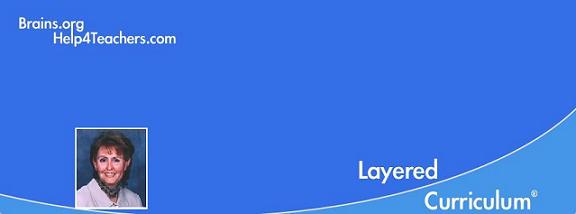__________Layered Curriculum®. . . because every child deserves a special education™_
 |
|
![]() _
_ ![]()
Layered
Curriculum TEXT & WORKBOOK
Set
for only
$43.95
(free shipping in
US)
Tweet
New Research May Suggest New Strategies for Working with Children At-Risk for Autism
(c)2017 Dr Kathie NunleyWhile children on the autism spectrum are all unique in their strengths and challenges, one of the commonalities is they struggle with Theory of Mind - or that aspect of humans that allows us to view things from another person’s perspective and understand they have an underlying mental state just as we ourselves do.
An interesting new piece of research (Ruffman, et al 2018) wandered across my desktop recently which may offer some interesting new ideas for working with young children at risk for autism - at least for perhaps helping them with the development of Theory of Mind. (ToM) The study involved almost 200 preschoolers between the ages of 2 and 5. These were all believed to be typically developing children (the study did not specifically seek out children at risk for autism). The first phase involved mothers describing pictures to their 2 year olds using the term “want”. Some mothers were scripted not to use the work at all, some mothers used the word “want” only in one context and some mothers used the term “want” in multiple contexts. They then tracked these children for six months, looking at the development of their theory of mind. What they found was that the children whose mothers used the word “want” in describing situations and people in multiple contexts had a significantly larger gain in the development of Theory of Mind.
In the second half of the study, the researchers looked at older preschoolers. Again they had parents using the word “want” but this time while reading stories to their children. Some of the stories only used the word “want” in one or very limited contexts and some stories used it in multiple contexts. Again, the children exposed to the stories that used the term “want” in multiple contexts made larger gains in ToM.
So, while this study was not specifically designed to look at development of ToM in children with autism, one can’t help wonder how this may apply here. It seems that we might want to incorporate more direct instruction for ToM on young children, particularly those at risk for autism, if in fact, the development of it is so easily supported.
Based on this study (and hopefully more to come) I might want to suggest parents and others working with young children, particularly those at risk for diagnosis on the spectrum, might seek to include stories, discussion and conversations focusing on the word “want” in as many contexts as possible.
Ruffman, T., Puri, A., Galloway, O., Su, J., & Taumoepeau, M. (2018). Variety in parental use of “want” relates to subsequent growth in children’s theory of mind. Developmental Psychology, 54(4), 677-688
About the Author:
Dr Kathie Nunley is an educational psychologist, researcher and author of several books on parenting and teaching, including A Student's Brain (Brains.org) and the best selling, "Differentiating the High School Classroom" (Corwin Press). She is the developer of the Layered Curriculum(r) method of instruction and has worked with parents and educators around the world to better structure schools to make brain-friendly environments. In addition, her work has been used by the Boeing Corporation, Family Circle Magazine, the Washington Post, and ABC television.
Email her: Kathie (at) brains.orgCopyright © 1998 - current year by Kathie F. Nunley.
All Rights Reserved.
Layered
Curriculum is a registered trademark developed by
Dr. Kathie F. Nunley.